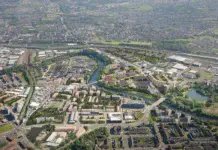
NEW research has revealed positive news for the UK construction industry over the next year, with ‘strong’ levels of activity expected despite concerns around the availability of materials and labour.
The findings were released in the latest RICS construction survey for the final quarter of 2021.
For Q4 2021, +33% of respondents said they continued to see increases in demand for construction work – the same level as reported in Q3. New infrastructure projects are behind much of the increase in workloads, with energy developments particularly prominent.
The private housing sector is also showing ‘solid momentum’ with a net balance of +37% of respondents reporting new works in this area.
For the year ahead, expectations of upcoming workloads increased to a net balance of +45%. Infrastructure is viewed as likely to lead the sector but private residential and non-residential works are also anticipated to deliver strong growth in output.
RICS added that the UK Government’s ‘Levelling Up’ white paper could also support construction workloads through new infrastructure, housing and non-residential works.
Business enquiries were at +37% in Q4 2021), while +10% of respondents said profit margins are anticipated to increase over the course of 2022.
Despite these positive sings, concerns around the availability of materials (84%) and labour (77%) suggested these problems continue to dominate, with Brexit and the pandemic also causing issues.
65% of respondents said they had difficulties finding bricklayers and carpenters.
Simon Rubinsohn, RICS chief economist, said, “There is clearly an upbeat tone to the feedback received from across the construction industry. However, the concerns around labour and in particular, skilled labour are just not going away. The long-term fix is to attract more younger people to the sector but that may be insufficient to address the immediate problem which significantly, is being reflected in expectations for a sharp uplift in wage costs over the next year.
“The presumption from professionals working in the industry is that this rise in pay will help provide a short-term fix as the strong projections for activity through the course in 2022 are premised on a further rise in headcount.”








